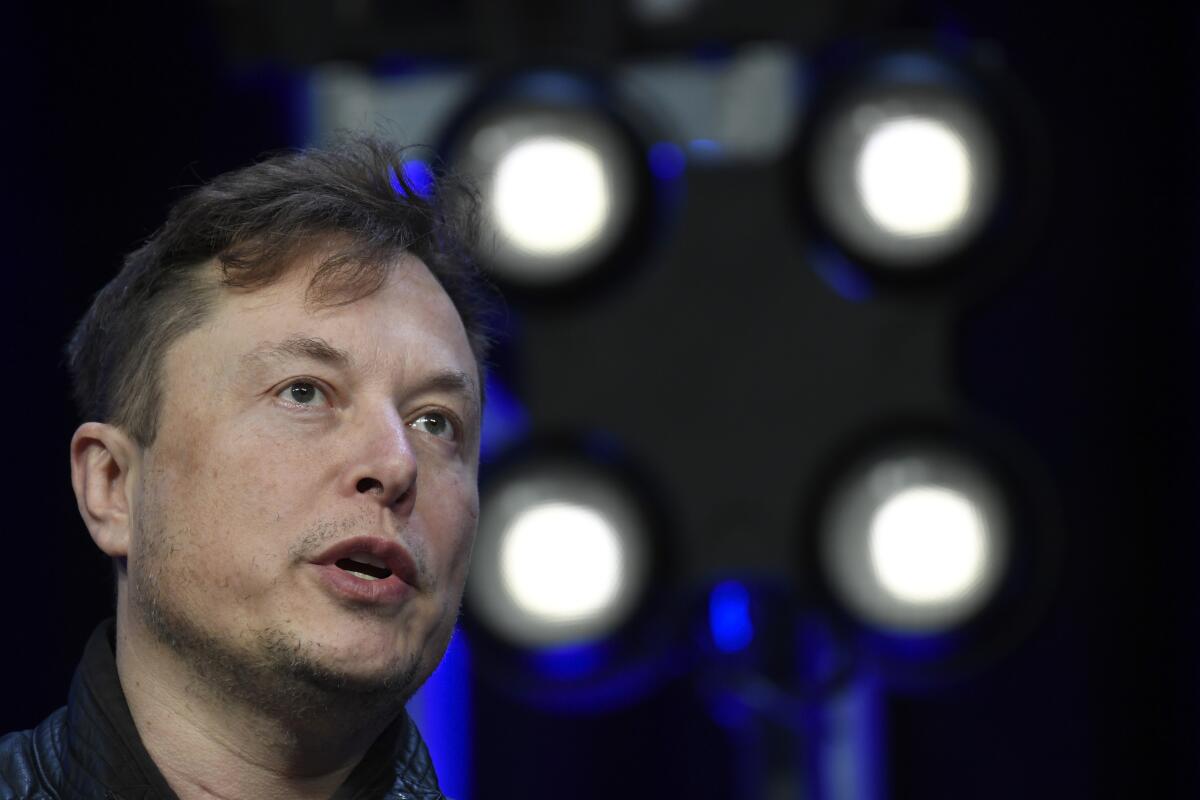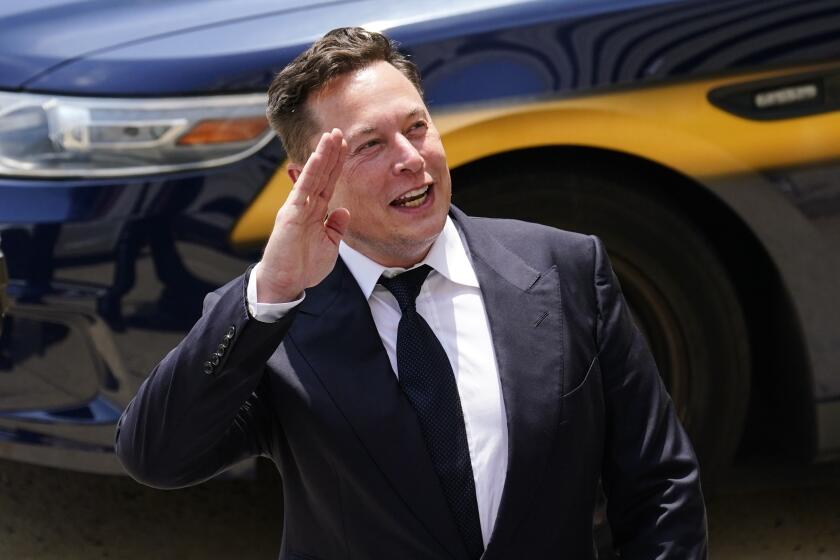Op-Ed: Will Twitter survive Elon Musk? I’m sticking around to find out

- Share via
I joined Twitter in April 2007, a year after its founding as a “microblogging platform.” I didn’t give much thought to my username. At first blush, Twitter looked like a place I shouldn’t be seen, like a strip club, so I chose an anonymous handle that combined my middle name and birthdate: @page88. I didn’t expect I’d be stuck with it for 15 years and counting.
When I learned that Twitter contacts were called followers, I found the notion cult-y and unnerving. My first tweet, “If they follow, will I lead?” got no likes.
For two years, I mostly ignored Twitter. Then, in 2009, at the South by Southwest tech conference, in Austin, I thought I saw its purpose. Conference insiders used it compulsively, especially to plan bar meetups. When in Rome. I sallied forth, seeking a companion to go with me to see Metallica at a 6th Street club. Again: nothing.
The social media company approved the billionaire and avid Twitter user’s $44-billion bid after 11 days of back and forth
Then I gave a conference talk — and I got what Twitter was really about.
The crowd in the room applauded generously for my presentation, but later I found they’d been live-tweeting it. Sometimes savagely. I was moping when I ran into David Carr, the late media critic who was then my colleague at the New York Times, and he told me to laugh it off: “People who use Twitter are twits.”
Neither of us quit it, though. I liked Twitter, even if it could be cutting. More often than not, it was perceptive and funny. Early on it seemed clear that people weren’t actually tweeting about “what they had for lunch,” as the eye-rolling articles had it. Instead, they were chipping off quips and learning a new way not to be a shrinking violet.
I chugged along for a couple of years, tweeting aimlessly about — I don’t really remember. Television shows? Babies? Maybe I did tweet about lunch. When Dick Costolo became Twitter’s chief executive in 2010, he admitted to a crowd that he didn’t know what Twitter was for. I didn’t either.
Conservatives who chafe against Twitter’s content moderation and banning of former President Trump see an upside in Elon Musk’s views on free speech.
At 11:11 p.m. on Monday, Costolo, who resigned from Twitter in 2015, tweeted: “Shoutout to the writer’s room at Silicon Valley for tonight’s wild episode.”
Costolo was referring to the flurry around the sudden sale of Twitter to Elon Musk, the self-titled “technoking” of Tesla, for $44 billion.
Referring to history as though it’s a TV series dreamed up in a writer’s room is commonplace stuff for Twitter. The meme captures the widespread impression that world events are so speedy and dramatic now that they’ve just got to be scripted.
Indeed, in a single day, Musk, the loose-cannon industrialist icon who — well, the controversies are too numerous to mention but they include wide-ranging allegations of horrifying racism — had swooped in like an 1980s corporate raider and snatched up the company.
The community of millions that figured out how to turn Twitter into a platform for real-world activism and power won’t survive this $44-billion deal.
On Monday, Erika D. Smith trenchantly observed in this newspaper what many on Twitter fear most about the Musk takeover: In the name of “free speech” for right-wingers and trolls, Musk will silence the marginalized voices that are Twitter’s soul.
“Consider this the beginning of the end of #BlackTwitter,” Smith wrote, “the community of millions that figured out how to turn a nascent social media platform into an indispensable tool for real-world activism, political power and change.”
Smith nailed it. In the last six or seven years, Twitter established an indispensable reason for being, and racist feudalism isn’t it. At its best Twitter emboldens non-dominant subcultures — from socialists to the #bancars crowd to ex-Republicans — to create subversive commentary, strategy, solidarity.
When Twitter banned then-President Trump from the platform for inciting violence (and sabotaging democracy) on and around Jan. 6, 2021, those other users could tweet and thread with even more verve and nuance, because the bully wasn’t sucking up all the air. Now some have predicted that Musk will bring @realDonaldTrump back. (Trump, for his part, has said he’d refuse.)
Although the highest and best uses of Twitter are at risk, fainting-couch despair may not be necessary. Musk is surely not a benevolent actor, but it’s probable that he won’t be able to wreck Twitter without wrecking the thing he really cares about: $TWTR.
Rick Wilson, author and co-founder of the Lincoln Project, tweeted, “Call me crazy, but I’m not tearing my (remaining) hair out over this.”
He went on to thread that “Daddy Musk,” for all his uninformed bloviating about “muh 1st Amendment free speech,” is not going to stop content moderation at Twitter. And if Musk brings Trump back, Wilson added, it would only hurt Trump’s political career by putting his worst traits back under klieg lights.
Indeed, Musk is unlikely to nix all content moderation, lest the platform be overrun with smut like the subscription site OnlyFans. And if far-right voices come to pervade Twitter, and it “gets filled with Holocaust denial, racial revanchism, Bitcoin spam, and Russian propaganda, and Seb Gorka porn” (as Wilson puts it), the revenge will be swift: “The market will devalue Twitter.”
I was turning over Wilson’s observations when I laughed out loud at “Seb Gorka porn.” The phrase is vintage Wilson and extremely Twitter. That’s why I liked it.
As long as dangerous and ridiculous true-life twits like Gorka — and Musk — can be mercilessly satirized on Twitter, I’m staying.
Virginia Heffernan is a Wired magazine columnist and host of the podcast “This Is Critical.”
More to Read
A cure for the common opinion
Get thought-provoking perspectives with our weekly newsletter.
You may occasionally receive promotional content from the Los Angeles Times.













